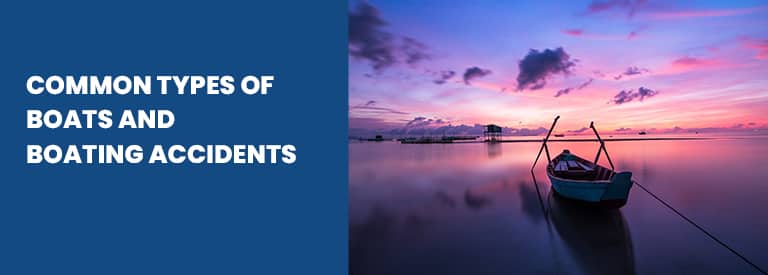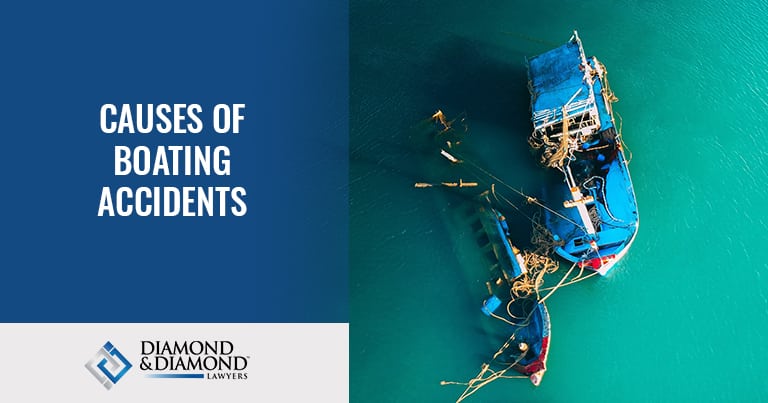Accidents happen anywhere, anytime, and boats are no exemption. When riding a boat, you may sustain injuries that stem from slip and falls and head-on collisions. If another party’s negligence caused the accident, you could file a claim to get compensated for the damages they have caused.
Causes of Boating Accidents
Distracted Boat Captain or Operator
One of the most common causes of boat accidents is the boat operator’s inattention. The primary duty of a boat’s captain is to take charge of driving and navigating the watercraft safely, making them responsible for keeping track of wind patterns and weather conditions and making sure that all maritime laws are being followed while on the water.
When a boat’s operator is distracted, it is possible that they will miss hazards in the water, make sudden and dangerous turns, or drive at dangerously high speeds, all of which can lead to a fatal boating accident.
Driving the Boat While Under the Influence
Same with vehicular collisions, driving while under the influence of alcohol and other illegal substances can play a significant role in boating accidents. If a boat captain operates his boat while intoxicated, his driving and navigating abilities are significantly impaired, leading to boating accidents that may cause severe injury or, worse, death.
Equipment Malfunction
Sometimes, a boat may have been installed with a faulty steering mechanism and defective motors or other boating machinery, leading to accidents. Aside from installation issues, inadequately maintained and inspected boating equipment can malfunction and cause a boat to sink, capsize, or even lead to an onboard fire.
Ensuring all boating equipment and machinery before going out onto the water can prevent serious accidents from occurring.
Adverse Weather Conditions
The weather can sometimes be unpredictable. One moment, the sky looks clear, then suddenly, it quickly takes a turn for the worse. In bodies of water, it is wise for you to steer away from high winds and heavy rains since they can severely impact boating conditions. These natural events can cause serious boat accidents.
Boat Operator Inexperience
Having an inexperienced boat captain drive your train is as dangerous as not preparing your boat. A boat driver with little to no experience may underestimate the complexity of piloting a boat and not understand navigation rules, maritime laws, and the SOPs when dealing with boating emergencies.
Driving a Boat at Excessive Speeds
Another major factor that affects boat accidents is the speed at which it is moving. Some collisions should have been minor if not for the high speeds of one or more boats. In addition, when boats drive at dangerously high speeds, the driver’s ability to spot and respond to hazards is greatly reduced. This can result in accidents that involve clashes and roll-overs.
Boat is Overloaded
A boat that carries too many people or cargo on its vessel is at great risk of capsizing due to overloading. When this happens, severe and sometimes fatal boating accidents occur.
Improper Lookout
Having a competent individual or team serve as lookout personnel is essential since they are responsible for scanning the waters for hazards that might put the boat and its passengers at risk. If the people assigned to perform this vital task are not paying attention and overlook these dangers, it can lead to fatal accidents.
Violation of Navigational Rules
Navigational rules are enforced by authorities to make sure that all boats on the water, especially the ones in areas with heavy boat traffic, are always safe. Even if many boat owners know how to operate their watercraft well, many are still not knowledgeable enough of the particular rules that need to be followed over the water. If a boat driver violates the navigation laws, accidents like collisions can happen.
Reckless Driving by Boat Operator
When a boat driver drives carelessly, he puts the safety of the passengers at risk. This often happens when the driver speeds up, attempts to perform tricks on the water, or makes sharp turns. The carelessness of the driver usually leads to severe and fatal injuries.
Common Types of Boats and Boating Accidents
 There are a lot of types of boats that you can find out there, but the most common types are listed below:
There are a lot of types of boats that you can find out there, but the most common types are listed below:
- Motor Boats
- Sail Boats
- Yachts
- Pontoon Boats
- Party Boats
- Ferries
- Cruise Ships
Common Boating Accidents
- Collisions – When a boat crashes to another vessel, the passengers may suffer serious or even fatal injuries. In most cases involving collisions, there is a negligent party, and the injuries sustained by the victims may be long-term.
- Fire Onboard – Boats have electrical lines and rely on various forms of fuel to function. If the boat is not properly maintained and a short circuit or ignition is present in the engine room, a fire or an explosion may occur. This event will put crew members and passengers at risk of burns, or worse, death.
- Capsizing – When at sea, the weather and water conditions are unpredictable, and when these two become extreme, strong winds and powerful waves may be present, and your boat can be capsized. Once your boat capsizes, the passengers, cargo, and other items on the boat are thrown around, leading to injuries and even drowning.
- Sinking – Sinking may occur due to a collision or internal damage. If the boat sinks at a fast rate, passengers face the risk of drowning.
Boating Safety Tips
Here are some boating tips that can keep you safe while at sea.
- Take a Boating Course
- Get a Free Vessel Safety Check
- Follow a Pre-Departure Checklist
- Be Weather-Wise
- Use Common Sense
- Know the Nautical Rules of the Road
- Designate an Assistant Skipper
- Develop a Float Plan
- Make Proper Use of Life Jackets
- Avoid Alcohol
- Be Aware of Carbon Monoxide
- Skip Swimming in a Marina
- Stay Clear of the Engine
Boat accidents can lead to injuries. Talk to a personal injury lawyer from Diamond & Diamond Law now if you or your loved one got hurt in a boat accident in or near Alberta.
Before going boating, you should make sure that you have a first-aid kit on board.
Pro Tip
Boat Accident Lawyers
Unlike car accidents, boat accidents are more complex due to maritime laws. If you’ve recently been in a boating accident, you should contact Diamond and Diamond today.
We have experienced lawyers who specialize in boating accidents that can help and guide you in your claim. They will also evaluate your case for FREE.
Read FAQs on Boat Accident Lawyer
Why is Carbon Monoxide a risk when boating?
Carbon Monoxide is a risk while boating since most of the equipment (engines, gas generators, cooking ranges, space heaters, water heaters, etc.) installed in boats emit Carbon Monoxide. If there is not enough ventilation inside the boat, the gas may cause death. Some early symptoms of carbon monoxide poisoning include irritated eyes, headache, nausea, weakness, and dizziness.
What equipment or tools do I need before going boating?
Before going out onto the sea, you should prepare your tools to ensure that you’ll be able to perform repairs while at sea. Some of the important tools you should always have in hand are a battery terminal puller, jumper or booster cables, Klein crimpers and strippers, and magnetic and flexible claw retrieval tools and mirrors.
Can I pursue a product liability claim for my boating accident?
Yes. If you think that the cause of your accident, which resulted in injuries, was faulty or defective boat parts, then you can pursue a product liability case against a boat manufacturer. You should note that in order to win the claim, you must be able to prove that the boat or a part of it was faulty and defective in some manner.



